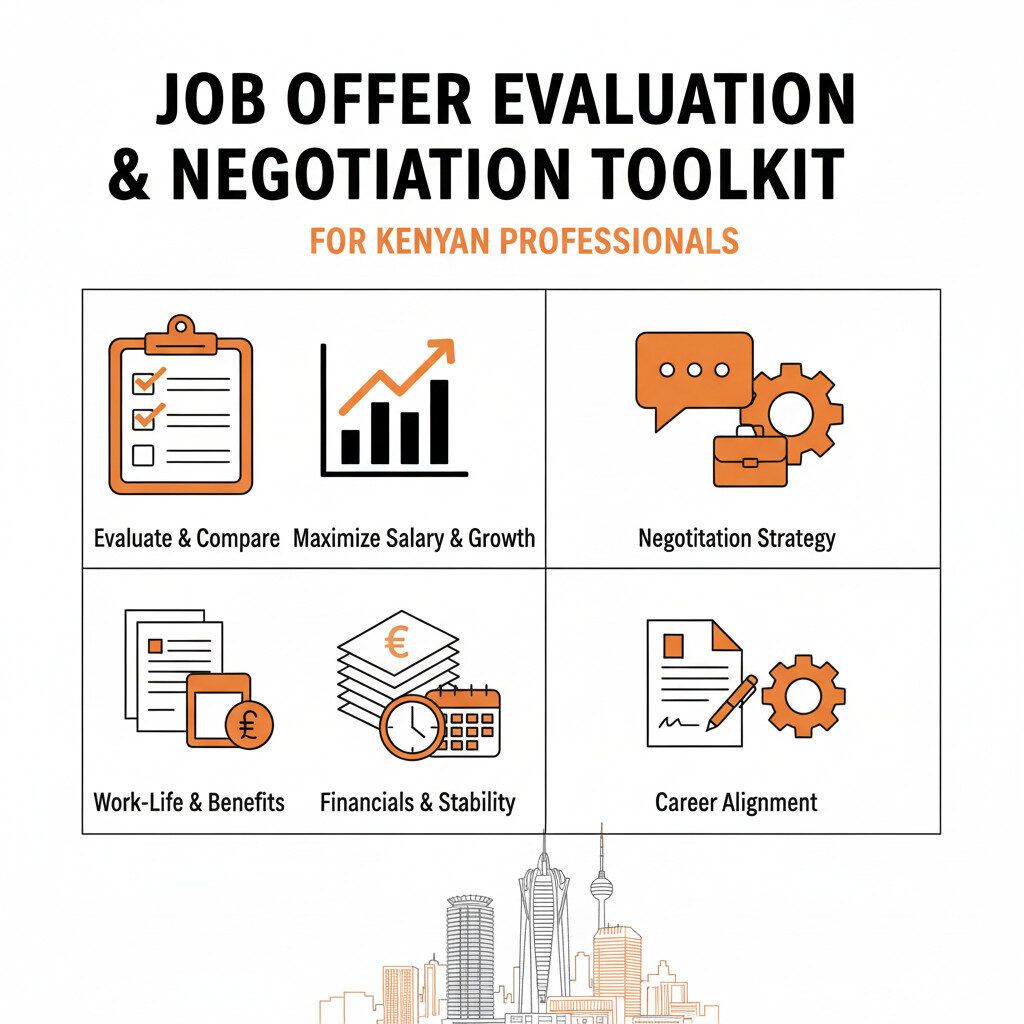Key Highlights
- This blog will guide you through job offer evaluation in Kenya and provide 5 actionable steps to negotiate job offers confidently, ensuring every offer supports your professional journey.
- Based on my research and experience, I was hoping we could discuss a starting salary of [Target Salary].
- I am confident in the value I’ll bring and look forward to finding a mutually agreeable solution.
Job Offers in Kenya Can Shape Your Career
Job offers in Kenya are exciting, but navigating them strategically is crucial for long-term success. Imagine Jane, a young professional in Nairobi, receiving her first offer. Excited, she’s tempted to accept immediately, but is it the best move for her salary, benefits, and career growth?
Many professionals accept offers without proper evaluation, missing opportunities to maximise compensation or secure roles aligned with their career goals. This blog will guide you through job offer evaluation in Kenya and provide 5 actionable steps to negotiate job offers confidently, ensuring every offer supports your professional journey.
The Old Way: Accepting the First Offer
- Focus only on salary
- Fear of negotiating or asking for more time
- Ignore company culture or growth opportunities
- Make impulsive decisions
The New Way: Strategic Job Offer Evaluation
- Compare multiple offers strategically
- Consider salary, benefits, career growth, and company culture
- Conduct market research for informed negotiation
- Negotiate professionally using evidence-based tactics
- Make decisions aligned with long-term career goals
| Old Way | New Way |
|---|---|
| Accept first offer immediately | Compare offers strategically |
| Focus only on salary | Evaluate salary, benefits, growth, and culture |
| Avoid negotiation | Negotiate job offers Kenya with confidence |
| Impulsive decision-making | Informed, strategic decision-making |
Why the Old Way Doesn’t Work
- 70% of job seekers in Kenya accept offers without negotiation (Kazicloud Candidate Survey, 2025).
- Professionals who negotiate job offers Kenya can increase their starting salary by 10–25%, improving long-term earnings.
- Global trends (LinkedIn, Glassdoor) show strategic negotiation enhances both career growth and job satisfaction.
Ignoring these strategies often results in suboptimal offers that limit financial and professional potential.

Step 1: Evaluate the Offer Holistically
Consider:
- Salary and benefits
- Career growth potential
- Company culture and work-life balance
- Location, flexibility, and team dynamics
Tip: Use a comparison chart for multiple offers to visualize your options.
Step 2: Research Market Rates
- Reference Glassdoor, LinkedIn Salary, PayScale for Kenyan benchmarks.
- Discuss with peers or mentors in your industry.
- Ensure your expected salary reflects both market standards and your experience.
Step 3: Request More Time if Needed
- Politely ask for additional time to consider the offer.
- Sample email:
“Dear [Employer Name],
Thank you for the offer for [Job Title]. I’m carefully considering this opportunity and would like a bit more time to make an informed decision. Could we extend the deadline to [new date]?
Thank you for your understanding.”
Step 4: Negotiate Salary and Benefits
- Highlight your value with research-backed evidence.
- If salary is fixed, negotiate alternative benefits: flexible hours, remote work, signing bonuses, or extra vacation.
- Sample email:
“Dear [Employer Name],
Thank you for offering me the [Job Title] position. Based on my research and experience, I was hoping we could discuss a starting salary of [Target Salary]. I am confident in the value I’ll bring and look forward to finding a mutually agreeable solution.”
- Early-career professionals can practice negotiation scripts with mentors to gain confidence.
Step 5: Accept, Decline, or Reconsider Strategically
- Accept if the offer aligns with your goals.
- Decline politely using a professional email:
“Dear [Employer Name],
Thank you for the offer. After careful consideration, I’ve decided to pursue another opportunity that aligns more closely with my career goals. I truly appreciate your time and hope to stay in touch.”
- If you regret a rejection, reach out promptly, expressing renewed interest.
“Professionals who approach job offers in Kenya strategically are more likely to secure higher salaries, better benefits, and faster career growth,” says Kazicloud CEO, Collins Okello.
Case Study: A Nairobi-based software engineer received two offers. By evaluating them carefully and negotiating terms, they increased their starting salary by 20% and secured a mentorship program, accelerating their career growth.
Get our “Job-Offer-Evaluation-and-Negotiation-Toolkit-for-Kenyan-Professionals”
Includes:
- Step-by-step checklist for evaluating offers
- Templates for requesting more time, negotiating salary, and declining politely
- Kenyan market salary research guide
Navigating job offers in Kenya strategically ensures each decision advances your career. Evaluate, compare, and negotiate offers confidently to secure the best opportunities for growth and financial reward.
At Kazicloud, we help professionals in Kenya negotiate job offers, evaluate opportunities, and achieve career growth.
📩 Ready to land the best job in Kenya? Join Kazicloud Elite Job Match today.
FAQs
1. How do I evaluate a job offer in Kenya?
Look at salary, benefits, growth opportunities, culture, and work-life balance.
2. Is it normal to negotiate salary in Kenya?
Yes—negotiation is expected and can significantly improve total compensation.
3. Can I ask for more time before accepting an offer?
Absolutely, employers usually respect a polite request for additional decision time.
4. What if I regret declining a job offer?
Contact the employer promptly, express renewed interest, and be transparent.
5. What should I consider beyond salary when accepting an offer?
Company culture, growth opportunities, benefits, and work-life balance are equally important.






